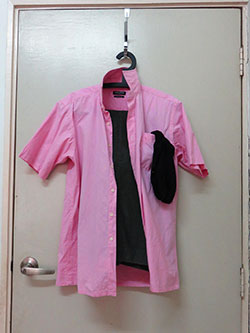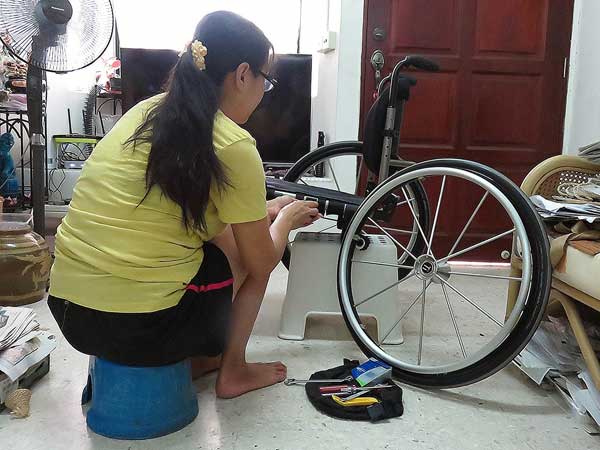A little help can go a long way
September 12, 2015, Saturday Peter Tan, mail@petertan.com

LIVING with physical impairments is a life full of hardships. For every one thing I can do, there are 1,001 others that I can’t. My barely functional thumbs and fingers make it difficult to perform whatever requires fine motor controls. Small objects like buttons and coins are particularly troublesome. Basically, I lack the dexterity even for the simplest of tasks.
Getting dressed used to be a 30-minute struggle to put on the diaper and pants, pull up the zip and button up the shirt. By the time I was done, I would be too exhausted to do anything else, let alone wear socks and shoes. The reverse would take an equal amount of time if not more because unbuttoning a shirt is even more difficult. Now my wife helps me and all it takes is just three minutes each time.
I may have accepted that I would never walk again a long time ago but the limitations to what I can do with my hands can still be very frustrating. I try not to think too much of it but at times I wish my spine was fractured a vertebra or two lower. That would have left me with full use of my hands. I would then be able to hold the spoon better or play the guitar, among others.
In the face of these inadequacies, I have two choices before me. I could either feel exasperated each time I struggled with a task or take it easy and accept the reality. I chose the second option as I discovered getting upset would not solve anything at all. Perhaps I have mellowed with age or maybe growing older has made me wiser. Whatever it is, it has reduced a lot of grief on my part.
I was building a Lego spaceship a few days ago when the tiniest bit of a part slipped from my fingers and fell onto the floor. With one hand holding on to the wheel of my wheelchair to prevent myself from tipping over, I bent down in an attempt to retrieve it.
As hard as I tried, I couldn’t grip it tight enough to pick it up. It took a good 20 minutes of patience and an aching arm before I finally managed to retrieve it by rolling it into an envelope. It was an unusual method. Most importantly, it worked. That was what mattered most.
It was not like this in the beginning. I had difficulty controlling my frustration whenever something like this happened in those early years. My mother bore the brunt of it as she was the sole caregiver then but she took it all in her stride. I am not proud of those outbursts.
Thinking back, I realise how I must have hurt her despite all she had done for me. If I could, I would do anything to make up for those times when I had so thoughtlessly chewed at her. There are times we don’t get a chance to make things right and this is one of them.
Being remorseful without a way to make amends is a painful feeling to bear. I have since learnt to keep my emotions in check no matter what. Loose lips not only can sink ships but also strain relationships. In the end, everyone gets hurt.
So what if I have to go through multiple challenges every day? Those around me also have to face challenges in trying their best to make it easier for me. If there is anything they deserve, it is respect and gratitude for standing by me through thick and thin, and certainly not my outrage.
As the years go by, I find that I need more help as I get weaker and weaker. Where I once could cook, do the laundry and mop the floor all in a single day, I now lack the stamina to even prepare the ingredients for a simple meal. Other than wearing clothes, I also have to depend on my wife for many of my daily chores.
Although her help is most welcomed, the sense of gradually having to depend on someone else more and more can be deflating and scary. I dread to think of the day when I have to fully depend on her for my every need. We would both be in our golden years by then.
This is why I am determined to see the Independent Living project take off. The personal assistant service will provide much-needed support for disabled people like me who need help one way or another. Consequently, I will become more productive as I don’t need to exert myself too much and become exhausted any more. I still may not be able to do 1,001 things but if I can achieve at least half of that, I will be more than happy already.
Read more: http://www.theborneopost.com/2015/09/12/a-little-help-can-go-a-long-way/#ixzz3uN1wFzgR

